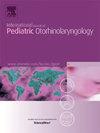Differences in language outcomes after cochlear implantation in children: Exploring the impact of auditory verbal therapy duration (0, 1, or 3 years)
IF 1.2
4区 医学
Q3 OTORHINOLARYNGOLOGY
International journal of pediatric otorhinolaryngology
Pub Date : 2025-04-29
DOI:10.1016/j.ijporl.2025.112371
引用次数: 0
Abstract
Objectives
This study aimed to evaluate the impact of Auditory Verbal Therapy (AVT) on spoken language and pragmatic skills five years after cochlear implantation in children enrolled in rehabilitation programs of varying durations (0, 1, 3 years).
Methods
The design was a retrospective cohort study, including 87 children with cochlear implants, grouped based on the duration of AVT: 19 in the 0-year group, 33 in the 1-year group, and 35 in the 3-year group. Language and pragmatic skills were assessed five years post-implantation, using the Clinical Evaluation Language Fundamentals.
Results
Significant differences were found in language development five years post-implant, with children receiving 3 years of AVT achieving higher Core Language Scores (CLS) and Expressive Language Index (ELI) scores than those with 0 or 1 year of AVT. No significant differences were found between the 0- and 1-year groups. The percentage of children performing within the normal range increased from 47 % (CLS) and 53 % (ELI) in the 0-year AVT group, to 61 % (CLS + ELI) in the 1-year AVT group, and 83 % and 80 %, respectively, in the 3-year AVT group. No group differences were found in pragmatic skills.
Conclusion
This study underscores the critical importance of early and extended AVT in facilitating optimal language development in children with cochlear implants. After five years, children who received 3 years of AVT continued to outperform those who received only 0 or 1 year of AVT. Longitudinal studies are needed to assess whether the effects of AVT on language and pragmatic skills persist or evolve over time.
儿童人工耳蜗植入后语言预后的差异:探讨听觉语言治疗时间(0年、1年或3年)的影响
目的本研究旨在评估听力言语疗法(AVT)对人工耳蜗植入后5年(0年、1年、3年)儿童口语和语用技能的影响。方法采用回顾性队列研究,纳入87例人工耳蜗植入儿童,按AVT持续时间分组:0岁组19例,1岁组33例,3岁组35例。使用临床评估语言基础对植入后5年的语言和语用技能进行评估。结果移植后5年的语言发育有显著差异,接受AVT 3年的儿童的核心语言评分(CLS)和表达语言指数(ELI)得分高于接受AVT 0年或1年的儿童。0岁组和1岁组之间无显著差异。在正常范围内的儿童百分比从0岁AVT组的47% (CLS)和53% (ELI)增加到1岁AVT组的61% (CLS + ELI), 3岁AVT组分别为83%和80%。在实用技能方面没有发现组间差异。结论本研究强调了早期和延长AVT对促进人工耳蜗儿童最佳语言发展的重要性。5年后,接受3年AVT治疗的儿童继续优于只接受0年或1年AVT治疗的儿童。需要进行纵向研究来评估AVT对语言和语用技能的影响是持续存在还是随着时间的推移而发展。
本文章由计算机程序翻译,如有差异,请以英文原文为准。
求助全文
约1分钟内获得全文
求助全文
来源期刊
CiteScore
3.20
自引率
6.70%
发文量
276
审稿时长
62 days
期刊介绍:
The purpose of the International Journal of Pediatric Otorhinolaryngology is to concentrate and disseminate information concerning prevention, cure and care of otorhinolaryngological disorders in infants and children due to developmental, degenerative, infectious, neoplastic, traumatic, social, psychiatric and economic causes. The Journal provides a medium for clinical and basic contributions in all of the areas of pediatric otorhinolaryngology. This includes medical and surgical otology, bronchoesophagology, laryngology, rhinology, diseases of the head and neck, and disorders of communication, including voice, speech and language disorders.

 求助内容:
求助内容: 应助结果提醒方式:
应助结果提醒方式:


